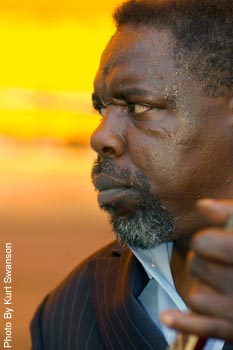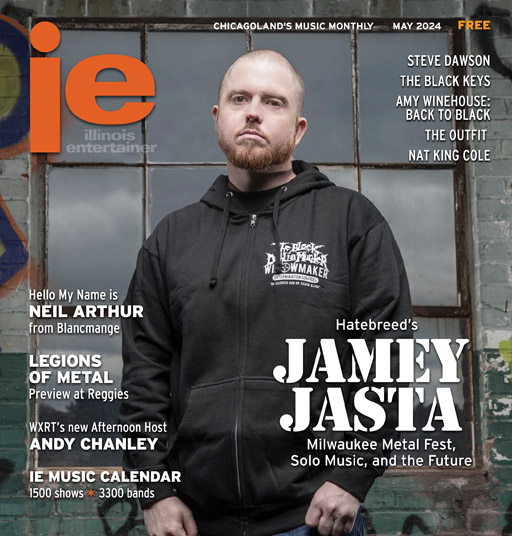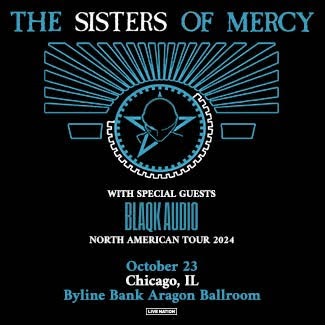Bell2
Click here to return to page 1.
Six years later Bell’s parents brought him back to Chicago to attend Marshall High School, then known as Crane, where he formed an R&B band with some classmates. Despite the widespread popularity of soul and R&B in the black community then, Bell remained committed to the blues. “My favorite music in my heart — I loved the blues,” he warms. “I knew I was going to be a blues artist for some reason.”
Bell dropped out of high school in the mid ’70s and became a full-time musician at the age of 17 at his father’s invitation. Carey took him to various clubs where he would sit in, honing his chops. He remembers sitting in with Lovie Lee at a club called John’s Place at 59th and Honore. Consumed with a passion for the blues and surrounded by some of the greatest players of the day, Bell worked diligently to develop his sound. “I would listen to them and pay attention to what they were doing, but when I picked up the guitar, I found myself creating my own sound.” His grasp of the idiom was remarkable for someone his age. He channeled the deep blues of the Mississippi Delta, the music of his father’s generation, with urban energy, grit, and dazzling virtuosity.
Bell’s career was on the ascent throughout the late ’70s and into the ’80s. He played bass on guitarist Eddie C. Campbell’s King Of The Jungle (Rooster), recorded an album with his father called Heartaches And Pain (Delmark), and co-founded the Sons Of Blues with harmonica player Billy Branch (who guests on Let’s Talk About Love). The SOBs performed at the Berlin Jazz Festival (presented as the New Generation Of Chicago Blues) and recorded three cuts on the Grammy-nominated series Living Chicago Blues (Alligator). Bell left the SOBs after a few years and hooked up with Koko Taylor, traveling extensively and solidifying his reputation. He toured and recorded with father Carey on the 1984 release Son Of Gun (Rooster). Embraced by the blues industry, Bell was also lauded by the mainstream media: Rolling Stone and The New York Times touted him as the next big thing.
Bell’s musical career advanced upward by leaps and bounds, but his personal life was free-falling. Struggling to corrall his thoughts, Bell continued to record and play sporadically, and the blues community — itself beginning a struggle for its life — looked out for him as best as it could.
Self-servingly, journalists and record executives clung to antiquated blues stereotypes and chose to portray Bell as possessed by “demons,” rather than the victim of a treatable medical condition. The Chicago blues community had found its very own Robert Johnson, the tortured musician chased by hellhounds and in cahoots with the Devil. Bell became a “voodoo child.”
Where devils roam so do angels, however, and when photographer Susan Greenberg came into Bell’s life in early 1990s slowly things began to change. Unable to connect with most people, Bell felt an instant kinship with her when they met at West Side haunt Rosa’s Lounge. They became fast friends and eventually lovers. Once she heard him play, Greenberg was convinced Bell was a gifted musician and fought tenaciously renew his image. She went to Delmark and insisted they record the recoveree. Agreeing, Delmark backed four solo efforts: Mercurial Son (1995), 700 Blues (1997), Kiss Of Sweet Blues (1998), and Blues Had A Baby (1999). Greenberg’s evocative black-and-white cover shots were the perfect complement to Bell’s often stark and gritty urban blues.
Bell is confident the confusion from that time has subsided. “I’m kind of like past the demons that I’ve seen in my life,” he says. “I’m kinda like, you know, into a situation where I don’t have ’em no more in my life. Maybe they were there, but music has healed and moved all them demons away. That’s the way I look at it with the type of music that I am doing.”
In conversations with Greenberg over the years, she said it took Bell another decade to overcome his fears and be able to play comfortably in front of an audience. He found the professional help he needed, and with Greenberg’s guidance was able to stay on the medication that enabled him to regain self-confidence. In 2001 he recorded the critically acclaimed Cuttin’ Heads for the Indiana-based Vyper label. The same year Bell and Greenberg were the subject of a documentary by filmmaker Paul Marcus, Mercurial Son: The Blues Of Lurrie Bell.
With his career back on track, he and Greenberg felt confident to start a family. In November 2002, they gave birth to twins, Elijah and Corrina Bell-Harrington. The babies were more than two-months premature, tiny and weak. Elijah rallied enough to be taken home, but passed away five months later. Corrina never left the hospital. She passed away two months after Elijah. It was a situation eerily similar to Bell’s early life, when he lost two sisters to diabetes.
Greenberg and Bell were devastated. Recovery seemed unthinkable as they struggled to make sense of the tragedy. Bell, ironically, emerged as the strong one. He was a rock, and as time passed the couple began to recover together. In 2005, Greenberg gave birth to Aria Avalokiteshvara Bell Greenberg, a healthy baby girl.
Bell reunited musically with his father. Carey Bell — who watched his son deteriorate from afar and kept his residence in the Carolinas during the hard-won recovery — lived an unattached life as the consummate traveling blues man, but agreed to the release of 2004’s Second Nature (Alligator), a live recording containing mostly acoustic performances the two recorded in Finland in 1991. The Bells reunited again on Gettin’ Up (Delmark), a live set recorded at Rosa’s, Buddy Guy’s, and Lurrie’s living room on three dates: July 27th and 28th, and October 21st, 2006. The project was a success and father and son were booked to play the 2007 Chicago Blues Festival to promote the release. Unfortunately Carey passed away a month too soon, though Lurrie kept the date and performed in tribute.
At the July 28th session in Lurrie’s house, the Bells visited traditional blues themes in “Broke And Hungry,” “When I Get Drunk,” and “Short Dress Woman.” Lurrie provides the highlight of “Gettin’ Up” for the final number, ripping into a solo version of the gospel perennial “Stand By Me” as his wife and daughter looked on. The lyrics were prophetic, as Lurrie sang, “Oh Lord, oh Lord, please stand by me/why don’t you stand by me as I walk this narrow way/help me to bear this heavy load/and if I stumble pick me up/help me to drink from the bitter cup.”
As evidenced by keeping the Blues Fest commitment, Bell has remained strong. He attributes his strength to his music, his faith in God, and the love he shared with Greenberg. Whenever the blues descend upon him, he picks up his guitar, and literally plays them away. As long as he can play his guitar, Bell says, he is O.K.
“I always knew that if I keep playing,” he avers, “that I’m going to be able to deal with life on a spiritual and more powerful way.”
On the topic of Love, Greenberg and Bell discussed his next recording project months before she passed, and they decided Bell should produce it himself. The argument was he would have more artistic freedom and collect royalties without having to give a percentage to a record company. After her death, with the help of the Greenberg family, Lurrie launched his own imprint, Aria B.G. Records, named for their daughter. Bell brought in longtime friend and harmonica player/singer-songwriter Matthew Skoller, who has self-produced his own recordings as well.

Let’s Talk About Love represents a new direction for the guitarist. Skoller and Bell set out to dispel the myth of the “haunted” bluesman pursued by “demons” in favor of focusing on Lurrie Bell, the musician, the stylist. “Musicians start to distill, like old brandy,” Skoller says. Present-day Bell is not the same musically as he was at 16. He has matured as a musician and as a man, and Skoller felt it was imperative to give Bell the artistic freedom to express himself without limiting him to preconceived notions of what a bluesman should be.
In choosing the songs for Let’s Talk About Love, it helped that Skoller has known Bell for more than 27 years. Having played together often, Skoller is familiar with Bell’s style (and vice versa) and has watched him grow and mature as an artist. As a musician he knows what Bell is capable of, and in that light he sought to find tunes that would showcase not only Bell ‘s guitar playing, but his voice as well. “Lurrie Bell is one of the great blues guitar players,” says Skoller, “but no one concentrates on his vocal prowess.”
As the project took shape, it became clear to Skoller “Lurrie was really interested in tunes that spoke about love, songs he could sing directly from his heart to you.” Lurrie wanted to talk about Greenberg, in the most loving and positive way. The title track, by Ray Agee, opens the album as a bouncy, uptempo shuffle that celebrates love: “You know it makes you want to shout/I don’t have a doubt/Because I got to tell the world what it’s all about/I feel so good, when I talk about love.”
Well aware of Bell’s prodigious deep-blues chops, Skoller sought to imbue the CD with a more sophisticated, less raw approach to the blues. Prior to making the record, Lurrie went to see B.B. King for the first time as a sort of lesson — although he was familiar with King’s music, he had never seen him perform. According to Skoller, Bell was blown away. He was in awe of King’s mastery of phrasing, that he had crafted a distinctive style. It was something Lurrie took with him into the studio.
Let’s Talk About Love has a measured, laid-back feel to it. It swings gently from Willie Dixon’s “Earthquake And Hurricane” (featuring some heartfelt harmonica backing and soloing by harp master Billy Branch), to the solo acoustic gem, J.B. Lenoir’s “Feeling Good” (featuring the venerable Jimmy Johnson harmonizing masterfully with Lurrie). Billy Flynn’s “Missing You” reflects Bell’s feelings for Greenberg, yet keeps the beat up. He channels guitar master Albert King (with a hint of Otis Rush) on Little Richard’s poignant “Directly From My Heart To You,” gets funky on Hip Linkchain’s “Cold Chills,” and serious on Willie Dixon’s slow blues, “Chicago Is Loaded With The Blues.” As reliable as ever, Skoller blows harp on the shuffle “Wine Head Woman.”
To supplement his “sophisticated” attack, Skoller assembled a band of top professionals including guitarist Anthony Palmer, bassist Felton Crews, drummer Kenny Smith, and pianist/organist Sidney James Wingfield. A group called The Sacred Cousins, including Cynthia Butts, James F. Teague, and Marro-Di’Jon Murry, were then enlisted to provide background vocals on the title track and Pops Staples’ “Why (Am I Treated So Bad).”
Bell feels Let’s Talk About Love is among his best work largely because he was given the freedom to express himself. “I guess these days — after all that’s been happening — it makes you more powerful, if you are into music. It’s like every time I play now, I’m really putting my whole soul and heart into it. Because every note, every lyric means something to me. Means more than ever.”
Having had so much taken from him, one could understand if Bell was reticent to dedicate the smallest piece of himself to anything. But he doesn’t.
“I can really put my whole soul into it. That’s what I did with this CD. I tried to put 150 percent into it. This is something that I can think of Susan and my father. I think of them on this particular CD, and I remember them when they were here.”
And we’ll never forget Lurrie Bell, because he still is.
— Beverly Zeldin-Palmer
Click here to return to page 1.











